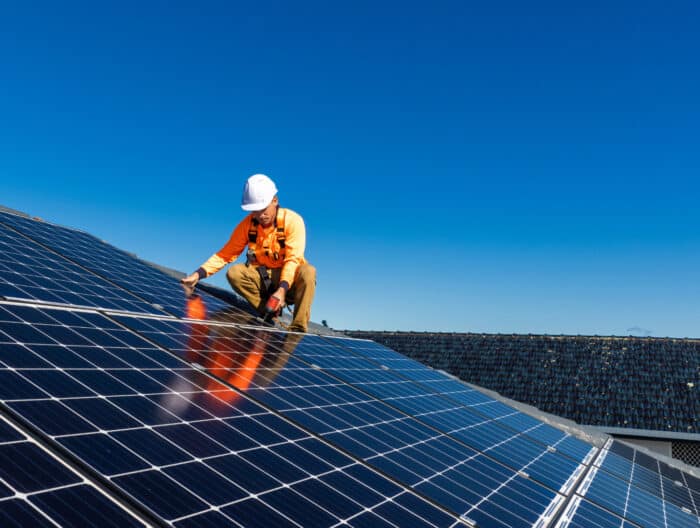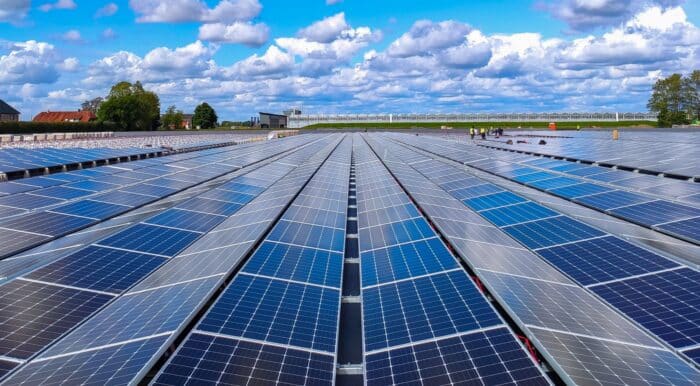Commercial solar systems are starting to make a real difference to many businesses across the country. Not only by reducing their carbon footprint and impact on the environment, but also as a long lasting and practical business investment.
Due to the comparatively simple install process, the abundance of commercial rooftop space and the incredibly high potential for return it’s easy to see why companies are turning to solar to reduce their costs and build a sustainable future.

But, for many businesses, deciding whether solar power is the right renewable energy solution for their business is a key question.
Hopefully this guide, exploring the advantages and disadvantages of solar power will help you make an informed decision.
What are solar panels and how do they work?
Solar panels, or PV (photovoltaic panels) as they are also known, consist of many individual cells that are made from layers of semiconducting material (generally silicon).
When light shines on the panels, the panels generate a direct current (DC) of electricity. This DC electricity is then converted to an alternating current (AC) which can then be used to generate power for your business.
Typically, each solar panel generates around 350 – 405W of energy in strong sunlight, with less being generated on extremely cloudy days. Due to the UK’s changeable weather patterns, it is common for businesses to invest in battery storage to allow them to store any excess energy generated on sunny days which can then be used on cloudy days or evenings.
What’s the difference between PV and thermal energy?
The concept is the same, both can be installed and fitted in the same way, but Solar PV panels use sunlight to generate electricity whereas thermal systems are used directly for heating water or air.
Is solar energy reliable?
In a word, yes, although it will depend on your business location and the amount of sunlight that your building typically receives. Whilst solar energy is definitely most effective in the summertime it can still be extremely effective in the winter months. It is however advisable that you reduce your reliance on solar energy in the winter months.

How many solar panels would my business need?
Every solar project and every business are different, but there are several determining factors that will influence how many solar panels you are likely to need.
– Electricity consumption
How much energy does your business consume? How much electricity will your business need? Generally, a review of your existing energy consumption will be required. This information will be taken from your energy bills, half-hourly data, and other sources to work out your total requirement in Kilowatt-hours (kWh).
– The size and stability of your roof
The space available is ultimately the key factor that determines the number of solar panels that you can actually install. A detailed survey will also determine whether your roof is stable enough to withstand the weight of the panels and how they can be angled towards the sun.
– Sunlight hours
The amount of energy that solar panels can generate is dependent on the hours of sunlight you will receive. The hours of sunlight across the UK does vary and will affect the number of solar panels that you’ll need to meet your energy requirements.
– Site complexities
If your business premises are complex in design or roof spaces hard to reach, then it is likely that your solar system is going to be more expensive to install, which may affect the number of panels. It is important to remember that the best solar panel systems aren’t the largest, but the ones that are the most efficient.

What are the advantages of solar power for my business?
As energy costs begin to rise, putting your roof space to good use can be a sensible decision. Commercial solar panel energy offers a wide range of benefits for business, some of which include:
– Solar income
In an ideal world you would use all your solar power that you generate. However, any additional surplus power can be sold back to the National Grid.
– Lower carbon footprint
Generating your own solar energy will significantly reduce your company’s carbon footprint.
– Better Corporate Social Responsibility (CSR)
As well as actively being better for the environment on its own merit. Solar panels can highlight your business’s commitment to environmental causes. Increasingly customers are making greener choices when they shop, solar panels are great for boosting your Corporate Social Responsibility.
– Cost savings
Solar panels generate free and green electricity during sunlight hours, this lowers your demand for energy from the National Grid. Therefore generating considerable cost savings on your energy bills.
– Reduce dependence
Reduce your area’s dependence on imported energy and finite resources.
– Energy security
Reducing your reliance on the National Grid, means that your business is less vulnerable to power cuts and other outages. Stored electricity on-site can give your business a supply to fall back on, should this be needed.

What are the disadvantages of solar power for my business?
While solar power can be a great thing, just like most energy options, it also has its disadvantages.
– Initial costs
Although in the long-term solar panels can save you money, initially there is a high up-front cost.
– Space
More electricity, means more solar panels and ultimately more roof space is required.
– Solar storage
In order to power a 24-hour business, you will need a 24-hour power supply. Solar energy relies on sunlight and has to be used right away or stored in large batteries for later. Solar storage can be extremely expensive to upkeep.
– The weather
Solar panels are dependent on sunlight to effectively gather and store solar energy, on days when the weather isn’t so bright, you will notice a decrease in energy efficiency.
How much do solar panels cost?
There are many individual factors which will affect the cost of a solar system, however, generally commercial solar panels can cost anything between £9,500 – £51,000 for a small to medium-sized business.
Are there any funding schemes available for commercial solar panels?
There are a number of government initiatives that can help you invest in solar panels. It’s a good idea to research if you’re eligible to apply for any of these funding options before you invest. Read our full guide on what tax relief schemes are in place here:
Why solar power is a smart investment for your business
Investing in solar power for your business is a multifaceted concept that encompasses financial, environmental, and social benefits. Yes, there is a lot of thought and planning involved, but the energy saving benefits you will receive long term, as well as the positive environmental impact make solar smart investment for your business.